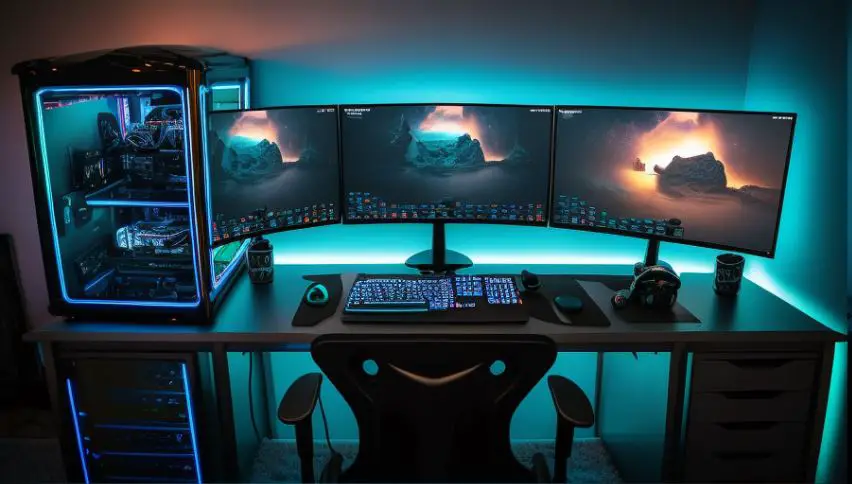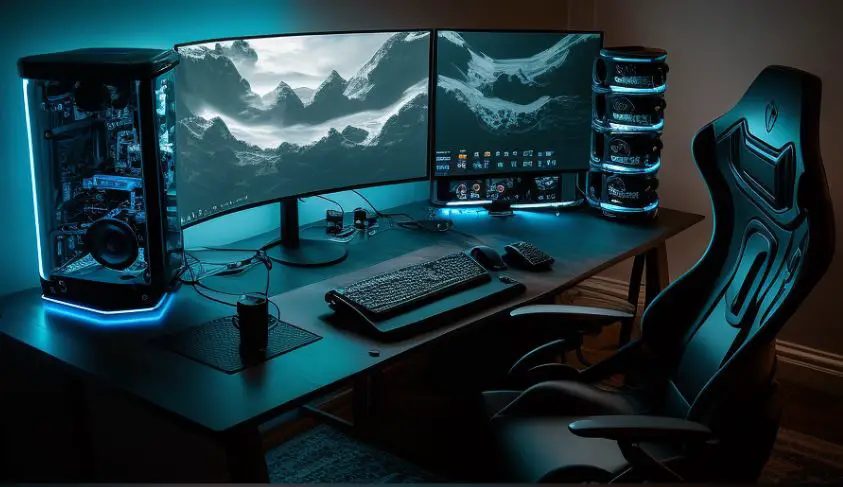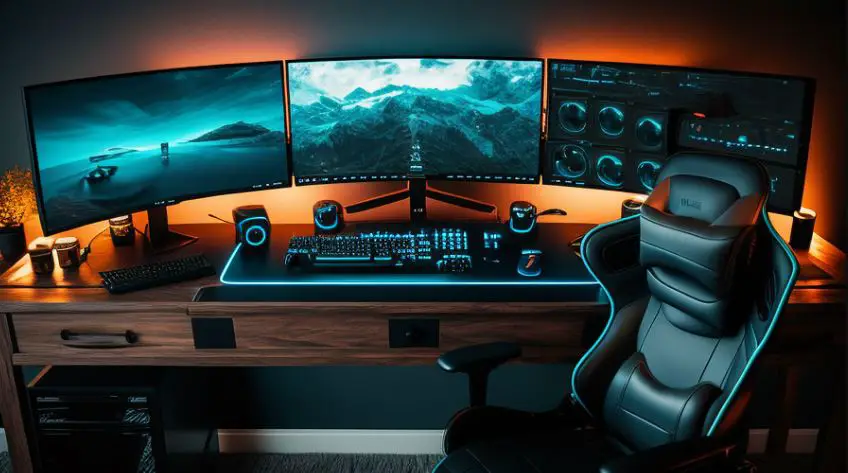Introduction

Are you tired of experiencing lag, slow load times, and stuttering during your gaming sessions? Fear not, because we’ve got you covered! In this comprehensive guide, we will explore various ways to optimize your PC for the ultimate gaming experience. From hardware upgrades to software tweaks, we’ll help you get the most out of your gaming rig. So, let’s dive in!
The Importance of PC Optimization
Smoother gameplay
By optimizing your PC, you’ll be able to enjoy smoother gameplay with fewer interruptions. This means less lag, faster load times, and a more enjoyable gaming experience overall.
Longer lifespan for your hardware
Optimizing your PC not only improves performance but also extends the life of your hardware. Keeping your components cool and running efficiently can prevent premature wear and tear.
Hardware Upgrades: In-Depth Insights
Graphics Cards
Upgrading your graphics card is one of the most effective ways to enhance your gaming experience. A higher-end card can deliver better performance, higher resolutions, and more detailed visuals. When selecting a new graphics card, consider the following factors:
- VRAM: Higher VRAM allows the card to handle larger textures and more complex 3D models, leading to smoother gameplay and more detailed visuals.
- Clock Speeds: Faster clock speeds result in quicker rendering of graphics, which can improve frame rates and overall performance.
- Architecture: Look for cards with newer architecture, as they are more energy-efficient and often come with additional features that can enhance your gaming experience.
RAM (Random Access Memory)
Increasing your RAM capacity can help reduce load times, prevent stuttering, and support multitasking during gaming sessions. Here’s what to consider when upgrading your RAM:
- Capacity: Aim for at least 16GB of RAM for a smooth gaming experience, although 32GB or more can provide even better performance for high-end games and multitasking.
- Speed: Faster RAM speeds can lead to quicker data transfer and improved performance. Look for RAM with higher MHz ratings.
- Compatibility: Ensure that the RAM you choose is compatible with your motherboard and CPU to avoid any compatibility issues.
SSD (Solid-State Drive)
Replacing your traditional hard drive with a solid-state drive (SSD) can significantly improve load times, system responsiveness, and overall performance. When selecting an SSD, consider the following:
- Capacity: Choose an SSD with enough storage capacity to accommodate your operating system, games, and other essential files.
- Read and Write Speeds: SSDs with higher read and write speeds will lead to quicker data transfers and improved system performance.
- Form Factor: Select an SSD with the appropriate form factor for your system, such as M.2, SATA, or PCIe NVMe, depending on your motherboard’s compatibility.
Cooling Solutions


Proper cooling is essential for maintaining optimal performance and prolonging the lifespan of your hardware components. Overheating can lead to reduced performance, crashes, or even permanent damage. Consider these cooling options:
- CPU Cooler: Invest in a high-quality air or liquid CPU cooler to maintain optimal temperatures during intense gaming sessions.
- Case Fans: Additional case fans can improve airflow within your PC, helping to dissipate heat more effectively.
- Thermal Paste: Replace the stock thermal paste on your CPU and GPU with a high-quality aftermarket paste to improve heat transfer and lower temperatures.
Power Supply
A reliable and efficient power supply is crucial for providing consistent power to your hardware components. When upgrading your power supply, consider the following:
- Wattage: Ensure your power supply has enough wattage to support your hardware upgrades, including the graphics card, CPU, and other components.
- Efficiency: Look for a power supply with an 80 Plus certification, which indicates higher energy efficiency and can save you money on your electricity bills.
- Modularity: A modular power supply allows you to use only the cables you need, reducing clutter and improving airflow within your PC.
By focusing on these essential hardware upgrades, you can significantly enhance your PC’s gaming performance, allowing for a more immersive and enjoyable gaming experience.
The Importance of PC Optimization: Additional Insights
Enhanced Visual Experience
Optimizing your PC can greatly improve the visual quality of your games. By upgrading your hardware and fine-tuning your in-game settings, you can achieve higher resolutions, more detailed textures, and smoother animations, ultimately leading to a more immersive and engaging gaming experience.
Better Multi-tasking Capabilities
A well-optimized PC can handle multiple tasks simultaneously, allowing you to run other applications in the background without affecting your gaming performance. For example, you can stream your gameplay, communicate with teammates using voice chat, or manage downloads while still maintaining a smooth gaming experience.
Improved Energy Efficiency
Optimizing your PC can lead to better energy efficiency, which is not only environmentally friendly but also cost-effective. By upgrading to energy-efficient hardware components, adjusting your power settings, and managing your system’s cooling, you can reduce your electricity consumption and save on your energy bills.
Greater Stability
A properly optimized PC is less likely to crash or experience technical issues, ensuring a more reliable gaming experience. Regular maintenance, such as updating drivers, cleaning your system, and keeping your hardware components cool, can prevent unexpected errors, crashes, or performance drops.
Future-proofing Your Gaming Rig
Investing time and effort in optimizing your PC ensures that it stays up-to-date with the latest gaming technologies and requirements. As games continue to push the boundaries of technology and demand more from your hardware, a well-optimized PC will be better equipped to handle these advancements, ensuring a long-lasting and enjoyable gaming experience.
Additional Sections
Regular Maintenance and Cleaning
Keeping your PC clean and well-maintained can significantly impact its performance and lifespan. Dust and debris accumulation can cause overheating and reduced performance. Ensure you clean your PC’s interior, including fans and heatsinks, at least once every six months.
Physical Cleaning
Regularly clean your PC case, fans, and heatsinks using compressed air or a soft brush. Remove any dust and debris that might have accumulated over time to maintain optimal airflow and cooling.
Software Maintenance
In addition to hardware cleaning, it’s crucial to maintain your software by performing regular disk cleanups, scanning for malware, and updating your applications to the latest versions.
Customization and Personalization
Optimizing your PC for gaming also allows you to customize and personalize your gaming experience. By tweaking in-game settings, you can tailor the visuals, audio, and gameplay to your preferences, ensuring a truly unique experience tailored to your needs and playstyle.
Custom Keybindings and Macros
Customize your keyboard and mouse settings to create a more efficient and comfortable gaming experience. Set up custom keybindings and macros for specific in-game actions, allowing you to execute complex commands quickly and effortlessly.
Monitor and Display Settings
Adjust your monitor’s settings, such as refresh rate, color calibration, and response time, to enhance your gaming experience further. Pairing these optimizations with your in-game settings can lead to a more immersive and visually stunning experience.
By understanding the importance of PC optimization and taking the necessary steps to improve your system, you can enjoy a more satisfying, stable, and visually impressive gaming experience.
Software Optimization
Update your drivers
Keeping your drivers up-to-date is crucial for smooth gameplay. Regularly update your graphics, audio, and chipset drivers to ensure compatibility and optimal performance.
Optimize your operating system
Disable unnecessary startup programs, adjust your power settings for maximum performance, and clean up your hard drive to free up valuable space. Also, consider using game booster software for an extra performance boost.
Adjust your in-game settings
Fine-tuning your in-game settings can greatly improve your gaming experience. Consider the following:
Resolution
Lowering your resolution can significantly improve your frame rate. However, don’t go too low, as it can affect the overall quality of the visuals.
Textures and shaders
Reducing texture quality and shader settings can help improve performance, especially on lower-end systems. Experiment with these settings to find the perfect balance between performance and visual quality.
Internet and Connectivity
A stable and fast internet connection is crucial for online gaming. Poor connectivity can lead to lag, high ping times, and disconnections, which can greatly impact your gaming experience. Here’s how to optimize your internet and connectivity for smoother online gaming:
Wired vs. Wi-Fi Connection
A wired connection using an Ethernet cable is generally faster and more stable than a Wi-Fi connection. If possible, connect your gaming PC directly to your router or modem using an Ethernet cable. However, if a wired connection is not feasible, consider the following tips to improve your Wi-Fi connection:
- High-Quality Router: Invest in a high-quality router that supports modern Wi-Fi standards (such as Wi-Fi 6) and offers features like beamforming and MU-MIMO for better performance.
- Router Placement: Position your router close to your gaming PC and minimize obstructions between them. Keep the router elevated and away from walls and metal objects that could interfere with the signal.
- Dual-Band or Tri-Band: Choose a router with dual-band or tri-band capabilities to reduce network congestion and improve Wi-Fi performance.
- Wi-Fi Extenders or Mesh Systems: If your gaming PC is far from your router, consider using a Wi-Fi extender or a mesh Wi-Fi system to improve signal strength and coverage.
Network Prioritization
To ensure your gaming sessions receive the necessary bandwidth, prioritize gaming traffic on your network. Some routers have built-in Quality of Service (QoS) features that allow you to prioritize specific devices or applications. Configure your router’s QoS settings to give priority to your gaming PC or the games you play.
Port Forwarding
Some online games require specific ports to be open on your router for a stable connection. Check your game’s documentation or support website for information on required ports and configure your router to forward those ports to your gaming PC.
Gaming VPN (Virtual Private Network)


A gaming VPN can help reduce lag, improve ping times, and protect your privacy while gaming online. When choosing a gaming VPN, consider the following factors:
- Low Latency: Look for a VPN with low latency to minimize delays in data transmission, resulting in smoother gameplay and better response times.
- Server Locations: Choose a VPN with multiple server locations, allowing you to connect to a server closest to the game server for improved performance.
- No Bandwidth Caps: Ensure the VPN you choose does not impose bandwidth caps or throttling, which could negatively impact your gaming experience.
- Strong Encryption and Privacy: Select a VPN with strong encryption and a strict no-logs policy to protect your data and privacy while gaming online.
By optimizing your internet and connectivity, you can significantly improve your online gaming experience, ensuring smoother gameplay, better response times, and a more enjoyable experience overall.
Conclusion
Optimizing your PC for the ultimate gaming experience requires a combination of hardware upgrades and software tweaks. By following the tips outlined in this guide, you’ll be well on your way to enjoying smoother gameplay, faster load times, and a more immersive gaming experience. Happy gaming!
FAQs
- Do I need to upgrade all my hardware components to optimize my PC for gaming?
No, focus on upgrading the most critical components, such as your graphics card, RAM, and SSD. These upgrades will have the most significant impact on your gaming experience. - How often should I update my drivers?
It’s a good practice to check for driver updates every few months, or whenever you experience performance issues or compatibility problems with a game. - Is it necessary to use a gaming VPN?
While not essential, a gaming VPN can offer benefits like reduced lag, improved ping times, and increased privacy. If you frequently play online games, it may be worth considering. - Can I optimize my gaming experience without spending money on hardware upgrades?
Yes, by tweaking your in-game settings, updating drivers, and optimizing your operating system, you can improve your gaming experience without investing in new hardware. - What are the benefits of using game booster software?
Game booster software can optimize your PC’s resources, close unnecessary background processes, and improve system performance specifically for gaming.

